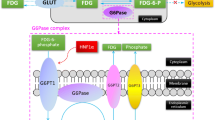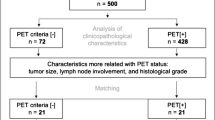Abstract
Background
Selection of patients for hepatic resection of colorectal liver metastases is still limited. After conventional work up by computed tomography (CT) scan, 60% of patients will develop recurrent disease in the early years after resection. The aim of the present study was to evaluate whether an additional fluorine-18-deoxyglucose positron emission tomography (FDG-PET) improves patient selection and therefore adds value to select patients for curative liver resection.
Methods
Data from 203 patients selected for surgical treatment of colorectal liver metastases between 1995 and 2003 were collected in a prospective database. Group A consisted of 100 consecutive patients selected for hepatic surgery by conventional diagnostic imaging (CT chest and abdomen) only. Group B consisted of 103 consecutive patients selected for hepatic surgery by conventional diagnostic methods plus an additional FDG-PET.
Results
The number of patients with futile surgery, in which further treatment was considered inappropriate at laparotomy, was 28.0% in group A and 19.4% in group B. The reason for unresectable disease differed between groups. In group A, 10/100 (10.0%) patients showed extrahepatic abdominal disease versus 2/103 patients (1.9%) in group B (P = .017). In all other cases, resection was not performed because liver disease proved too extensive at laparotomy. For patients ultimately undergoing surgical treatment of the metastases, survival was comparable between groups. Overall survival at 3 years was 57.1% in group A versus 60.1% in group B. Disease-free survival at 3 years was 23.0% in group A and 31.4% in group B.
Conclusions
In patients with colorectal liver metastases, FDG-PET may reduce the number of negative laparotomies. However, the effect size on the selection of these patients seems not sufficient enough to affect the overall and disease-free survival after treatment.



Similar content being viewed by others
References
Galandiuk S, Wieand HS, Moertel CG, Cha SS, Fitzgibbons RJ Jr, Pemberton JH, Wolff BG. Patterns of recurrence after curative resection of carcinoma of the colon and rectum. Surg Gynecol Obstet 1992; 174:27–32
Russell AH, Tong D, Dawson LE, Wisbeck WM, Griffin TW, Laramore GE, Luk KH. Adenocarcinoma of the retroperitoneal ascending and descending colon: sites of initial dissemination and clinical patterns of recurrence following surgery alone. Int J Radiat Oncol Biol Phys 1983; 9:361–5
Russell AH, Tong D, Dawson LE, Wisbeck W. Adenocarcinoma of the proximal colon. Sites of initial dissemination and patterns of recurrence following surgery alone. Cancer 1984; 53:360–7
Abdalla EK, Vauthey JN, Ellis LM, Ellis V, Pollock R, Broglio KR, Hess K, Curley SA. Recurrence and outcomes following hepatic resection, radiofrequency ablation, and combined resection/ablation for colorectal liver metastases. Ann Surg 2004; 239:818–25
Topal B, Kaufman L, Aerts R, Penninckx F. Patterns of failure following curative resection of colorectal liver metastases. Eur J Surg Oncol 2003; 29:248–53
Hughes KS, Simon R, Songhorabodi S, Adson MA, Ilstrup DM, Fortner JG, Maclean BJ, Foster JH, Daly JM, Fitzherbert D. Resection of the liver for colorectal carcinoma metastases: a multi-institutional study of patterns of recurrence. Surgery 1986; 100:278–84
Steele G, Jr., Osteen RT, Wilson RE, Brooks DC, Mayer RJ, Zamcheck N, Ravikumar TS. Patterns of failure after surgical cure of large liver tumors. A change in the proximate cause of death and a need for effective systemic adjuvant therapy. Am J Surg 1984; 147:554–9
Arulampalam TH, Costa DC, Bomanji JB, Ell PJ. The clinical application of positron emission tomography to colorectal cancer management. Q J Nucl Med 2001; 45:215–30
Beets G, Penninckx F, Schiepers C, Filez L, Mortelmans L, Kerremans R, Aerts R, De Roo M. Clinical value of whole-body positron emission tomography with [18F]fluorodeoxyglucose in recurrent colorectal cancer. Br J Surg 1994; 81:1666–70
Delbeke D, Vitola JV, Sandler MP, Arildsen RC, Powers TA, Wright JK, Jr, Chapman WC, Pinson CW. Staging recurrent metastatic colorectal carcinoma with PET. J Nucl Med 1997; 38:1196–201
Flamen P, Hoekstra OS, Homans F, Van Cutsem E, Maes A, Stroobants S, Peeters M, Penninckx F, Filez L, Bleichrodt RP, Mortelmans L. Unexplained rising carcinoembryonic antigen (CEA) in the postoperative surveillance of colorectal cancer: the utility of positron emission tomography (PET). Eur J Cancer 2001; 37:862–9
Imdahl A, Reinhardt MJ, Nitzsche EU, Mix M, Dingeldey A, Einert A, Baier P, Farthmann EH. Impact of 18F-FDG-positron emission tomography for decision making in colorectal cancer recurrences. Langenbecks Arch Surg 2000; 385:129–34
Schiepers C, Penninckx F, De Vadder N, Merckx E, Mortelmans L, Bormans G, Marchal G, Filez L, Aerts R. Contribution of PET in the diagnosis of recurrent colorectal cancer: comparison with conventional imaging. Eur J Surg Oncol 1995; 21:517–22
Staib L, Schirrmeister H, Reske SN, Beger HG. Is (18)F-fluorodeoxyglucose positron emission tomography in recurrent colorectal cancer a contribution to surgical decision making? Am J Surg 2000; 180:1–5
Vitola JV, Delbeke D, Sandler MP, Campbell MG, Powers TA, Wright JK, Chapman WC, Pinson CW. Positron emission tomography to stage suspected metastatic colorectal carcinoma to the liver. Am J Surg 1996; 171:21–6
Whiteford MH, Whiteford HM, Yee LF, Ogunbiyi OA, Dehdashti F, Siegel BA, Birnbaum EH, Fleshman JW, Kodner IJ, Read TE. Usefulness of FDG-PET scan in the assessment of suspected metastatic or recurrent adenocarcinoma of the colon and rectum. Dis Colon Rectum 2000; 43:759–67
Boykin KN, Zibari GB, Lilien DL, McMillan RW, Aultman DF, McDonald JC. The use of FDG-positron emission tomography for the evaluation of colorectal metastases of the liver. Am Surg 1999; 65:1183–5
Fong Y, Saldinger PF, Akhurst T, Macapinlac H, Yeung H, Finn RD, Cohen A, Kemeny N, Blumgart LH, Larson SM. Utility of 18F-FDG positron emission tomography scanning on selection of patients for resection of hepatic colorectal metastases. Am J Surg 1999; 178:282–7
Langenhoff BS, Oyen WJ, Jager GJ, Strijk SP, Wobbes T, Corstens FH, Ruers TJ. Efficacy of fluorine-18-deoxyglucose positron emission tomography in detecting tumor recurrence after local ablative therapy for liver metastases: a prospective study. J Clin Oncol 2002; 20:4453–8
Ruers TJ, Langenhoff BS, Neeleman N, Jager GJ, Strijk S, Wobbes T, Corstens FH, Oyen WJ. Value of positron emission tomography with [F-18]fluorodeoxyglucose in patients with colorectal liver metastases: a prospective study. J Clin Oncol 2002; 20:388–95
Fong Y, Fortner J, Sun RL, Brennan MF, Blumgart LH. Clinical score for predicting recurrence after hepatic resection for metastatic colorectal cancer: analysis of 1001 consecutive cases. Ann Surg 1999; 230:309–18
Strasberg SM, Siegal BA. Survival of patients staged by FDG-PET before resection of hepatic metastases from colorectal cancer. Ann Surg 2002; 235:308
Bradpiece HA, Benjamin IS, Halevy A, Blumgart LH. Major hepatic resection for colorectal liver metastases. Br J Surg 1987; 74:324–6
Ekberg H, Tranberg KG, Andersson R, Lundstedt C, Hagerstrand I, Ranstam J, Bengmark S. Determinants of survival in liver resection for colorectal secondaries. Br J Surg 1986; 73:727–31
Nordlinger B, Quilichini MA, Parc R, Hannoun L, Delva E, Huguet C. Hepatic resection for colorectal liver metastases. Influence on survival of preoperative factors and surgery for recurrences in 80 patients. Ann Surg 1987; 205:256–63
Resection of the liver for colorectal carcinoma metastases: a multi-institutional study of indications for resection. Registry of Hepatic Metastases. Surgery 1988; 103:278–88
Scheele J, Stangl R, Altendorf-Hofmann A. Hepatic metastases from colorectal carcinoma: impact of surgical resection on the natural history. Br J Surg 1990; 77:1241–6
Doci R, Gennari L, Bignami P, Montalto F, Morabito A, Bozzetti F. One hundred patients with hepatic metastases from colorectal cancer treated by resection: analysis of prognostic determinants. Br J Surg 1991; 78:797–801
Fegiz G, Ramacciato G, Gennari L, Doci R, Pezzuoli G, Leggeri A, Peracchia A, Montorsi W, D’Angelo F, Aurello P. Hepatic resections for colorectal metastases: the Italian multicenter experience. J Surg Oncol 1991; 2:144–54
Ohlsson B, Stenram U, Tranberg KG. Resection of colorectal liver metastases: 25-year experience. World J Surg 1998; 22:268–76
Rosen CB, Nagorney DM, Taswell HF, Helgeson SL, Ilstrup DM, van Heerden JA, Adson MA. Perioperative blood transfusion and determinants of survival after liver resection for metastatic colorectal carcinoma. Ann Surg 1992; 216:493–504
Scott S, Carty N, Anderson L, Taylor I. Liver resection for colorectal liver metastases. Eur J Surg Oncol 1995; 21:33–5
Taylor M, Forster J, Langer B, Taylor BR, Greig PD, Mahut C. A study of prognostic factors for hepatic resection for colorectal metastases. Am J Surg 1997; 173:467–71
Jenkins LT, Millikan KW, Bines SD, Staren ED, Doolas A. Hepatic resection for metastatic colorectal cancer. Am Surg 1997; 63:605–10
Bakalakos EA, Kim JA, Young DC, Martin EW Jr. Determinants of survival following hepatic resection for metastatic colorectal cancer. World J Surg 1998; 22:399–404
Delbeke D, Martin WH, Sandler MP, Chapman WC, Wright JK, Jr., Pinson CW. Evaluation of benign vs malignant hepatic lesions with positron emission tomography. Arch Surg 1998; 133:510–15
Flamen P, Stroobants S, Van Cutsem E, Dupont P, Bormans G, De Vadder N, Penninckx F, Van Hoe L, Mortelmans L. Additional value of whole-body positron emission tomography with fluorine-18-2-fluoro-2-deoxy-D-glucose in recurrent colorectal cancer. J Clin Oncol 1999; 17:894–901
Topal B, Flamen P, Aerts R, D’Hoore A, Filez L, Van Cutsem E, Mortelmans L, Penninckx F. Clinical value of whole-body emission tomography in potentially curable colorectal liver metastases. Eur J Surg Oncol 2001; 27:175–9
Yasuda S, Makuuchi Y, Sadahiro S, Mukai M, Tokunaga N, Tajima T, Shohtsu A. Colorectal cancer recurrence in the liver: detection by PET. Tokai J Exp Clin Med 1998; 23:167–71
Arulampalam T, Costa D, Visvikis D, Boulos P, Taylor I, Ell P. The impact of FDG-PET on the management algorithm for recurrent colorectal cancer. Eur J Nucl Med 2001; 28:1758–65
Desai DC, Zervos EE, Arnold MW, Burak WE Jr, Mantil J, Martin EW Jr. Positron emission tomography affects surgical management in recurrent colorectal cancer patients. Ann Surg Oncol 2003; 10:59–64
Lai DT, Fulham M, Stephen MS, Chu KM, Solomon M, Thompson JF, Sheldon DM, Storey DW. The role of whole-body positron emission tomography with [18F]fluorodeoxyglucose in identifying operable colorectal cancer metastases to the liver. Arch Surg 1996; 131:703–7
Ogunbiyi OA, Flanagan FL, Dehdashti F, Siegel BA, Trask DD, Birnbaum EH, Fleshman JW, Read TE, Philpott GW, Kodner IJ. Detection of recurrent and metastatic colorectal cancer: comparison of positron emission tomography and computed tomography. Ann Surg Oncol 1997; 4:613–20
Simo M, Lomena F, Setoain J, Perez G, Castellucci P, Costansa JM, Setoain-Quinquer J, Domenech-Torne F, Carrio I. FDG-PET improves the management of patients with suspected recurrence of colorectal cancer. Nucl Med Commun 2002; 23:975–82
Valk PE, Abella-Columna E, Haseman MK, Pounds TR, Tesar RD, Myers RW, Greiss HB, Hofer GA. Whole-body PET imaging with [18F]fluorodeoxyglucose in management of recurrent colorectal cancer. Arch Surg 1999; 134:503–11
Zhuang H, Sinha P, Pourdehnad M, Duarte PS, Yamamoto AJ, Alavi A. The role of positron emission tomography with fluorine-18-deoxyglucose in identifying colorectal cancer metastases to liver. Nucl Med Commun 2000; 21:793–8
Author information
Authors and Affiliations
Corresponding author
Rights and permissions
About this article
Cite this article
Wiering, B., Krabbe, P.F.M., Dekker, H.M. et al. The Role of FDG-PET in the Selection of Patients with Colorectal Liver Metastases. Ann Surg Oncol 14, 771–779 (2007). https://doi.org/10.1245/s10434-006-9013-0
Published:
Issue Date:
DOI: https://doi.org/10.1245/s10434-006-9013-0




